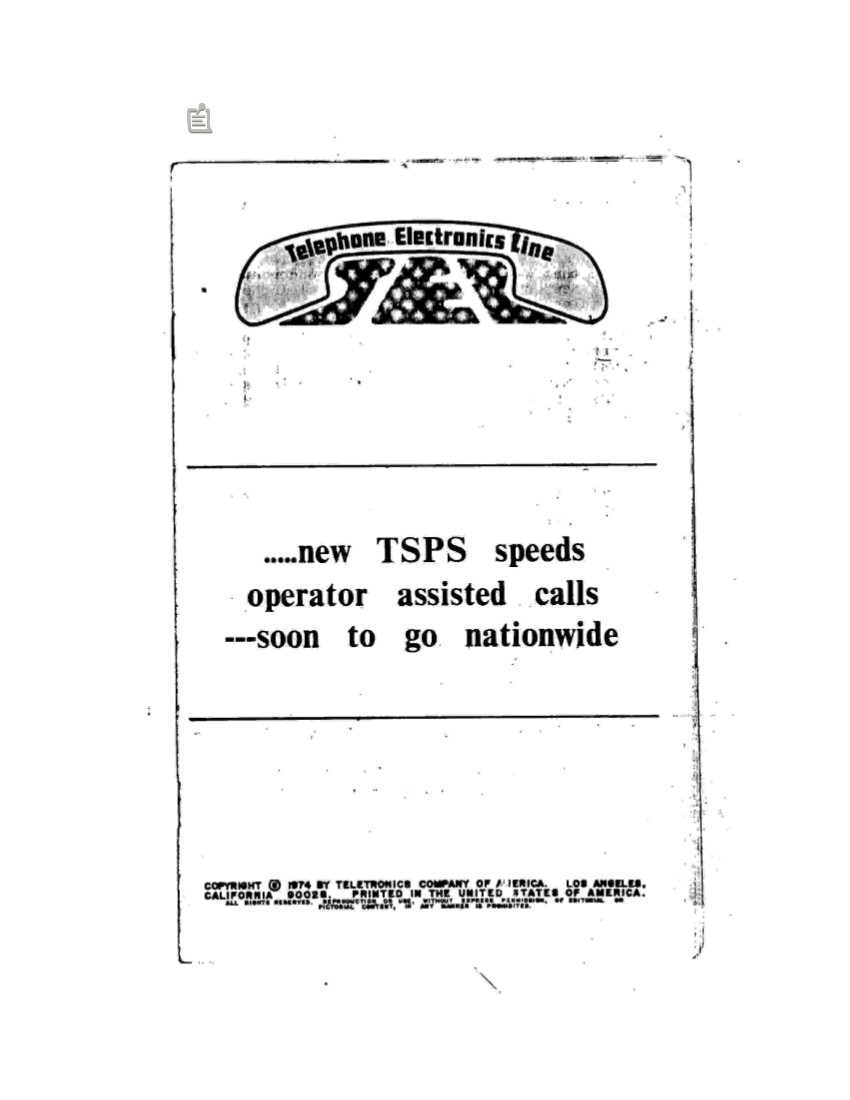TEL (Telephone Electronics Line), 1-7 (1974-1975)
Filed under magazine | Tags: · hacking, technology, telephone

“TEL (Telephone Electronics Line) was a small publication that was dedicated to phone phreaking and hacking. It began publishing in November 1974. TEL was similar to TAP but was geared totally toward phone phreaking. In 1975, Pacific Telephone & Telegraph won a lawsuit against the publishers of TEL. The Superior Court of California, County L.A. court ordered TEL to stop publishing immediately. Though never challenged in court, this was truly a violation of First Amendment rights. A letter was mailed to all subscribers advising them to destroy all back issues of TEL. TEL ceased publishing after only 7 issues.”
Comment (0)System.hack() (2006) [Croatian/English]
Filed under catalogue | Tags: · copyright, hacking, hacktivism, technology

System.hack() was an exhibition project and a book by Multimedia Institute realized through the collaborative platform Zagreb – Cultural Kapital of Europe 3000.
A moment of excellence in programming is called a hack. A perfect hack is surprising, mediagenic, innovative in employing technology, funny and non-violent. System.hack() is every hack that opens up a closed system or makes an open system dynamic.
System.hack() exhibition seeks to find connections between moments of excellence in different fields of human production. This exploration always has to provide answers to the following two questions: What system is being hacked?, and How this system is being hacked, or what is a specific hack in an individual work?
The exhibition environment is not a gallery, but the interior of a hotel room. The hotel room is supposed to function as the lowest common denominator of living environments users/viewers/visitors/readers inhabit. The hotel room also functions as a Table of Contents for the System.hack() book. Museum labels found on exhibited objects link individual hacks to the essays dealing with issues they raise and social context they intervene in.
Hacks exhibited: Orson Welles – War of the Worlds; Captain Crunch – whistle; Richard Stallman – GNU GPL; Heath Bunting – Superweed Kit 1.0; Michael Steil – Xbox Linux project; CD Protection Kit
Essay contributions by Jonah Brucker-Cohen, Benjamin Mako Hill, Marcell Mars, Tomislav Medak, Ognjen Strpic and Mckenzie Wark.
Original concept and production: Multimedia Institute (mama), Zagreb
Creative assistance: Vuk Ćosić and What, How and For Whom
Creative Commons BY-SA 2.5
96 pages
Exhibition website (at Archive.org)
PDF (updated on 2014-9-14)
Scribd
Kevin Mitnick: Ghost in the Wires: My Adventures as the World’s Most Wanted Hacker (2011)
Filed under book | Tags: · biography, computing, hacking, internet, networks

“Kevin Mitnick was the most elusive computer break-in artist in history. He accessed computers and networks at the world’s biggest companies–and however fast the authorities were, Mitnick was faster, sprinting through phone switches, computer systems, and cellular networks. He spent years skipping through cyberspace, always three steps ahead and labeled unstoppable. But for Kevin, hacking wasn’t just about technological feats-it was an old fashioned confidence game that required guile and deception to trick the unwitting out of valuable information.
Driven by a powerful urge to accomplish the impossible, Mitnick bypassed security systems and blazed into major organizations including Motorola, Sun Microsystems, and Pacific Bell. But as the FBI’s net began to tighten, Kevin went on the run, engaging in an increasingly sophisticated cat and mouse game that led through false identities, a host of cities, plenty of close shaves, and an ultimate showdown with the Feds, who would stop at nothing to bring him down.
Ghost in the Wires is a thrilling true story of intrigue, suspense, and unbelievable escape, and a portrait of a visionary whose creativity, skills, and persistence forced the authorities to rethink the way they pursued him, inspiring ripples that brought permanent changes in the way people and companies protect their most sensitive information.”
Written with William L. Simon
Foreword by Steve Wozniak
Publisher Little, Brown and Company, 2011
ISBN 0316134473, 9780316134477
review (J.D. Biersdorfer, The New York Times)
PDF (updated on 2016-12-23)
Comments (2)
